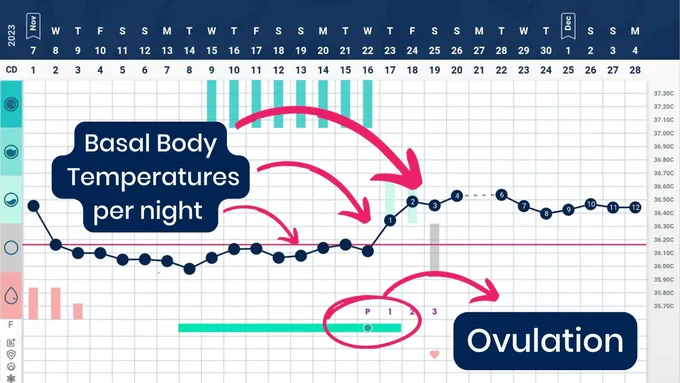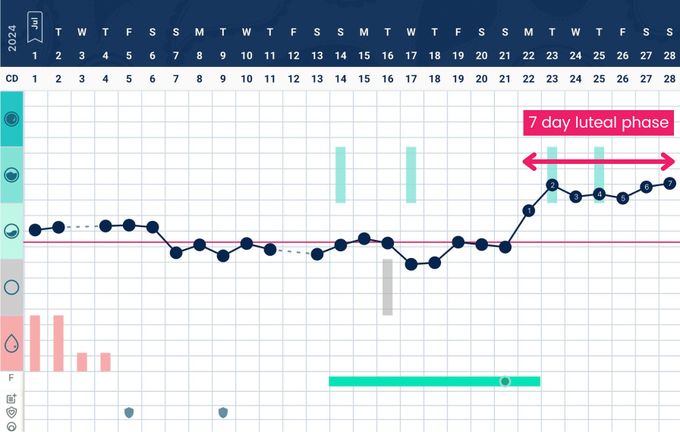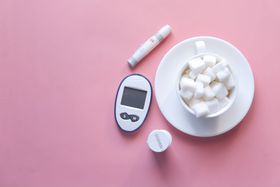What a Low Basal Body Temp Can Tell You About Your Health
Low basal body temperature can signal issues with hormones or thyroid function. By tracking it consistently, you can spot signs of thyroid dysfunction, anovulation, or low progesterone early.
Updated June 4, 2025

Your basal body temperature (BBT) is your lowest body temperature at rest. Most women measure it first thing in the morning, before getting out of bed or moving.
Tracking your BBT over time gives you clues about when—and whether—you ovulate. But it can also tell you something even more important: whether something’s off with your overall health.
What is Considered a Low Basal Body Temperature?
A consistently low BBT before ovulation (below 97.5°F / 36.4°C) can be a red flag.
If your temperature doesn’t rise after ovulation, you may not be ovulating at all.
This isn't just about getting pregnant. Your cycle is a reflection of your hormonal and metabolic health [1]. BBT is one of the simplest ways to track that from home.
Low BBT and Fertility: What It Might Mean
If your pre-ovulatory BBT is low and stays low throughout your cycle, it may point to [2]:
Anovulation (not ovulating at all)
Low thyroid function
Low estrogen or progesterone levels
Nutrient deficiencies or under-eating
Chronic stress or disrupted sleep
Any of these can disrupt your hormones and your ability to conceive.
Low BBT Before Ovulation: What to Look For
Some fluctuation is normal. But if your temperature stays flat or rarely crosses 97.5°F (36.4°C) before ovulation, ask yourself:
Am I getting at least 3 hours of sleep before taking my temp?
Am I using a reliable tracking method, like Tempdrop, which automatically measures my temperature while I sleep?
Do I see a clear temperature shift after ovulation?
If the answer is no, and this happens often, your body might be missing the hormonal cues needed for ovulation [3].
BBT and Thyroid Function
Your thyroid helps regulate heat in the body. If it slows down (hypothyroidism), your temperature drops. This often shows up as a low BBT.
Watch for these signs alongside a low BBT:
Always tired
Irregular or heavy periods
Dry skin and hair
Weight gain or trouble losing weight
Feeling cold all the time
Low mood or brain fog
If your pre-ovulatory BBT is consistently below 97.5°F / 36.4°C, bring it up with your healthcare provider. Ask them to test your thyroid (TSH, free T3, free T4, and thyroid antibodies).
What a High Basal Body Temperature Means
A clear BBT shift after ovulation is a good sign. It shows your body is producing progesterone. It's the hormone that holds the luteal phase together, the second half of your cycle.
Post-ovulation BBT should rise and stay above your pre-ovulatory baseline. If it doesn’t, your body may not be making enough progesterone. Short luteal phases (less than 11 days) can also point to low progesterone [4].
Your Period Can Give You Clues
Tracking how much you bleed matters. Use a menstrual cup or record it as light, medium, or heavy.
Too little bleeding? It could mean low estrogen.
Too much? It might mean high estrogen or low progesterone.
Normal flow is about 50 mL over 3–7 days, according to women's health expert Lara Briden [5].
How to Start Tracking Your BBT
Traditionally, you take your temperature with a basal thermometer each morning at the same time after at least 3 hours of sleep.
But there’s a smarter way:
Tempdrop is a wearable sensor that tracks your BBT automatically while you sleep.
You can wake up whenever and still get reliable data.
Pair it with a fertility app or paper chart to spot patterns.
What Your BBT Is Really Telling You
Consistently low basal body temperature is more than a fertility detail; it’s often a sign that something deeper is going on with your hormones or metabolism.
By paying close attention to your BBT, especially before ovulation, you can spot signs of thyroid dysfunction, anovulation, or low progesterone early.
Tracking this single metric can reveal a great deal about how your body is functioning. Whether you’re trying to conceive or just trying to feel like yourself again, your BBT chart is worth paying attention to.
If daily tracking feels overwhelming, tools like Tempdrop can simplify the process and help you stay consistent, without adding stress to your routine.
References:
- S. Solomon, Kurzer, and D. Calloway, “Menstrual cycle and basal metabolic rate in women,” American Journal of Clinical Nutrition, vol. 36, no. 4, pp. 611–616, Oct. 1982, doi: 10.1093/ajcn/36.4.611. Available: https://pubmed.ncbi.nlm.nih.gov/7124662/
- N. Šimić and A. Ravlić, “Changes in Basal Body Temperature and Simple Reaction Times during the Menstrual Cycle,” Archives of Industrial Hygiene and Toxicology, vol. 64, no. 1, pp. 99–106, Mar. 2013, doi: 10.2478/10004-1254-64-2013-2167. Available: https://pubmed.ncbi.nlm.nih.gov/23585200/
- “APA PsycNet.” Available: https://psycnet.apa.org/record/2016-45595-026
- N. M. Crawford, D. A. Pritchard, A. H. Herring, and A. Z. Steiner, “Prospective evaluation of luteal phase length and natural fertility,” Fertility and Sterility, vol. 107, no. 3, pp. 749–755, Jan. 2017, doi: 10.1016/j.fertnstert.2016.11.022. Available: https://pmc.ncbi.nlm.nih.gov/articles/PMC5337433/
- “Lara Briden - the Period Revolutionary,” Lara Briden - the Period Revolutionary, May 27, 2025. Available: https://www.larabriden.com/
Important Note: This blog does not provide medical advice. Always speak with your doctor before making any health decisions based on your BBT.
FAQs
Is 96.6 too low for BBT?
A BBT of 96.6°F is slightly lower than average but not necessarily abnormal. Some women naturally have lower temperatures, especially in the follicular phase. But, consistently low BBT could suggest thyroid issues or hormonal imbalances
Can my BBT be low and still be pregnant?
Yes, but it’s uncommon. BBT typically stays elevated after ovulation if you’re pregnant. A consistently low BBT may indicate an issue with progesterone levels or implantation, so it's best to consult a doctor if you're unsure.
What can lower my BBT?
Low BBT can be caused by:
- Thyroid dysfunction (especially hypothyroidism)
- Low progesterone levels
- Poor sleep or irregular sleep patterns
- Stress
- Illness or certain medications
- Measuring at inconsistent times
Should BBT be low during my period?
Yes, BBT is typically low during your period. This low temperature phase continues through the follicular phase until after ovulation, when progesterone causes BBT to rise
What does it mean if I have low BBT but normal thyroid function?
If you have low BBT but normal thyroid function, it could be due to low progesterone, poor sleep, stress, or inconsistent measurement habits.
It’s also possible your body’s baseline temperature is naturally lower. Tracking patterns over time can help identify if there’s a concern.
Could PCOS cause low BBT?
Yes, PCOS can cause low BBT. Irregular or absent ovulation, common in PCOS, can prevent the usual post-ovulation temperature rise driven by progesterone, resulting in consistently low or erratic BBT patterns.







